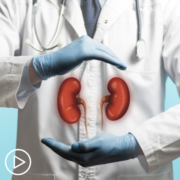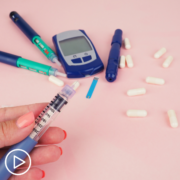What Are Treatment Options for Essential Thrombocythemia?
What Are Treatment Options for Essential Thrombocythemia? from Patient Empowerment Network on Vimeo.
MPN specialist Dr. Abdulraheem Yacoub reviews the various treatment approaches available to patients living with essential thrombocythmia (ET).
Related Programs:

|

|

How Should You Participate in MPN Care and Treatment Decisions? |
Transcript:
Dr: Yacoub:
So, let’s talk about essential thrombocythemia. This is among the other MPNs, the cancer with the lowest risk. Patients with essential thrombocythemia can have clots and can have bleedings. And they also often have symptoms because of their cancer.
But they also enjoy a long life expectancy that is almost indifferent from patients who don’t have cancer provided they get good care. So, our emphasis is on focusing that their life quality is not touched by their cancer, and focusing on treating patients with symptoms, to ameliorate the symptoms and allowing them to have a decent and good quality of life. At the same time, we would like to reduce the risk of clotting and bleeding.
And we have tools and medicines that are very effective at doing that in select patients who we define as high risk. And now there is a more clear definition of that. So, high-risk patients are patients who are over age 60 and have a JAK2 mutation, or patients who have already had a clot.
That is not the majority of ET patients actually. The majority are not high risk. And those patients might not require therapy to reduce their platelet count.
But for high-risk patients, we have tools to help them. So, hydroxyurea (Hydrea) is the most commonly used medicine in this setting.
The goal of hydroxyurea is to reduce the platelet count. And we’d like to keep it under 400, sometimes under 600 under different circumstances. And that will reduce the risk of clotting and bleeding for our patients. The other option, which I also feel passionate about is interferon.
Interferons are drugs that we’ve used for decades. They’re very effective. They’re safe in the right hands. And they do have advantages over hydroxyurea in terms of long-term safety. These are medications we can give to young patients, we can give to pregnant patients, we can give for long term without concerns of toxicity, and also they have a higher ceiling. Patients with interferon can achieve a disease control that we cannot achieve with hydroxyurea.
And this will be beneficial long term treating those patients. So, these – yeah, and then aspirin therapy is always something we would like to include in this regimen.
Katherine:
I was going to ask you about that. So, aspirin is still being used as a treatment?
Dr. Yacoub:
Absolutely. So, the standard of care is to use aspirin. Usually, one baby aspirin once a day, preferably in the morning is what we recommend. And that’s probably all the aspirin they need. We do not want them to take more than that either.










